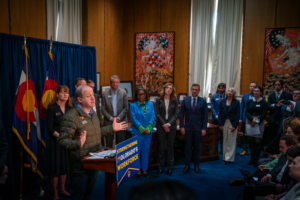For media inquiries, please contact Cynthia Eveleth-Havens at [email protected].

DENVER – The Colorado Chamber of Commerce applauded House Bill 1365, introduced today, which emerged from the work of the Education to Employment Alliance in partnership with the governor’s office. The Chamber and its alliance partners played a lead role in key provisions of the bipartisan proposal, titled “Opportunity Now,” which aligns Colorado’s workforce development efforts through regional talent development plans. The legislation is part of broad package of bills announced today at a press conference held by Gov. Jared Polis that will address workforce challenges in the 2024 session.
“Last fall, our Education to Employment Alliance brought forth actionable policy recommendations to bridge our skills gap and equip Coloradans with the tools they need to thrive,” said Colorado Chamber President and CEO Loren Furman. “This legislation will improve workforce outcomes statewide, connecting the right people from the business community, educational institutions, and government to identify the curriculum and skills needed to fulfill job opportunities across the state. This is a key component of the Chamber’s strategic priority to meet the workforce needs of our growing economy.”
The proposal, sponsored by Sen. Jeff Bridges, Rep. Meghan Lukens and Rep. Matt Soper, would devote $3.8 million to the creation of a regional talent development grant program and tax credits for training programs designed to alleviate workforce shortages. The grant program would be administered by the Colorado Office of Economic Development and International Trade, with awards going toward the launch of regional summits across Colorado. The bill requires short- and long-term plans to come from the summits to address the unique talent needs of Colorado’s local communities.
“Colorado has one of the most advanced economies in the nation, with the vast majority of jobs requiring some kind of education beyond high school,” said Sen. Bridges. “HB 1365 aligns our education system with employer needs, which means better pay for workers and a qualified workforce for businesses. That’s good for our economy, good for families, and great for Colorado.”
“Shaping the workforce of the future requires collaboration and innovative ideas, and this legislation addresses a critical need faced by both employers and workers across the state,” Rep. Lukens said. “Creating regional talent development plans will help provide consistency and align measurable goals to bolster Colorado’s talent pipeline and expand opportunity across our local communities.”
“We have a responsibility to ensure that our homegrown workforce can benefit from Colorado’s thriving economy,” said Rep. Soper. “Connecting key regional partners in business and education is critical to synchronizing career development pathways, ensuring we can fill available jobs now and into the future.”
The Education to Employment Alliance includes Colorado Inclusive Economy, Colorado Succeeds, the Colorado Technology Association, and Colorado Thrives – representing more than 2,000 employers across the state. The alliance developed a report that identified five policy goals and recommendations to boost the state’s talent pipeline, which helped shape many of the provisions in HB 1365. Workforce development is a key focus area of the Colorado Chamber’s 10-year strategic action plan to improve the state’s business climate.
Other bills in the governor’s workforce development package include initiatives that expand apprenticeships, create a longitudinal data system comparing the outcomes of degree programs and more.
To view HB 1365, please click here.
###
The Colorado Chamber of Commerce champions free enterprise, a healthy business environment and economic prosperity for all Coloradans. It is the only business association that works to improve the business climate for all sizes of business from a statewide, multi-industry perspective. What the Colorado Chamber accomplishes is good for all businesses, and that’s good for the state’s economy. It was created in 1965 based on the merger with the Colorado Manufacturers’ Association.
